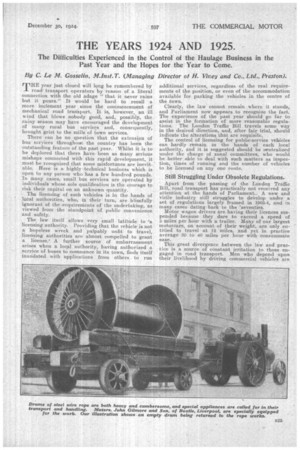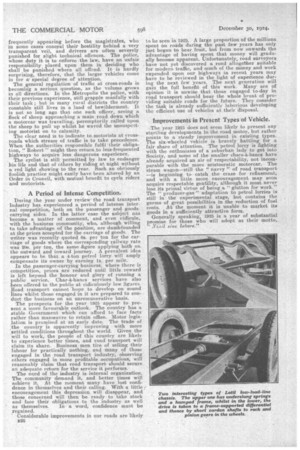THE YEARS 1924 AND 1925.
Page 9

Page 10

If you've noticed an error in this article please click here to report it so we can fix it.
The Difficulties Experienced in the Control of the Haulage Business in the Past Year and the Hopes for the Year to Come.
Bg C. Le M. Gosselin, M.Inst.T. (Managing Director at H. Viney and Co., Ltd., Pre.ston).
THE year just closed will long be remembered by road transport operators by reason of a literal connection with the old adage "that it never rains but it pours." It would be hard to recall a more inclement year since the commencement of mechanical road transport. It is, however, an ill wind that blows nobody good, and, possibly, the rainy season may have encouraged the development of many rural bus services and, consequently, brought grist to the mills of town services.
There can be no question that the extension of bus services throughout the country has been the outstanding feature of the past year. Whilst it is to be deplored that there have been SG many serious mishaps connected with this rapid development, it must be recognized that some misfortunes are inevitable. Here is a highly technical business which is open to any person who has a few hundred pounds. In many cases, small bus services are operated by individuals whose sole qualification is the courage to risk their capital on an unknown quantity.
The licensing of such vehicles is in the hands of ' local authorities, who, in their turn, are blissfully ignorant of the requirements of the undertaking, as viewed from the standpoint of public convenience and safety.
The law itself allows very small latitude to -`'a licensing authority. Providing that the vehicle is not a hopeless wreck and palpably unfit to travel, licensing authorities are almost compelled to grant a licence! A further source of embarrassment arises when a local authority, having authorized a service of buses to commence in its town, finds itself inundated with applications from others to run
additional services, regardless of the real requirements of the position, or even of the accommodation available for parking the vehicles in the centre of the town.
Clearly, the law cannot remain where it stands, and Parliament now appears to recognize the fact. The experience of the past year should go far to assist in the formation of more reasonable regulations. The London Traffic Bill travels some way in the desired direction, and, after fair trial, should indicate the alterations that are requisite.
The control of licensing for public-service vehicles can hardly remain in the hands of each local authority, and it is suggestedshould be oentralized under the charge of zonal committees' who would be better able to deal with such matters as inspection times of running and the number of vehicles to tie licensed on any one route.
Still Struggling Under Obsolete Regulations.
Apart from the passing of the London Traffic Bill, road transport has practically not received any attention at the hands of Parliament.. A new and virile industry still struggles to develop under a set of regulations largely framed in 1903-4, and in many cases dating back to the 'seventies. Motor wagon drivers are having their licences suspended because they dare to exceed a speed of
miles per hour with a trailer. Many of our largest motorcars, on account of their weight, are only entitled to travel at 12 miles, and yet in practice average 30 to 40 miles per hour with consummate ease.
This great divergence between the law and practice is a source of constant irritation to those engaged in road transport. Men who depend upon their livelihood by driving commercial vehicles are
frequently appearing before the magistrates, who in some cases conc.eal their hostility behind a very transparent veil, and drivers are often severely punished for slight technical offences. The police, whose duty it is to enforce• the law, have an unfair responsibility placed upon them in deciding who shall be punished where all offend: It is hardly surprising, therefore, that the larger vehicles come in for a special degree of attention.
The general regulation of traffic at cross-roads is becoming a serious question, as the volume grows in all directions. In the Metropolis the police, with their previous experience, still grapple manfully with their task ; but in many rural districts the country constable still lives in a land of bewilderment. It is not so long ago that one such officer, seeing a flock of sheep approaching a main road down which a motorcar was travelling, peremptorily called upon the sheep to pull up whilst he waved the unsuspeeting motorist on to calamity.
The clear need is to indicate to.motorists at crossroads which stream of traffic is to take precedence. When the authorities responsible fulfil their obligation, " Robert might then return to less-frequented highways to acquire less dangerous experience.
The cyclist is still permitted by law to endanger his life and that of others by riding at night without a red light showing to the rear. Such an obviously foolish practice might easily have been altered by an Order in Council, with mutual benefit to cycle riders and motorists.
A Period of Intense Competition.
During the year under review-the road transport industry has experienced a period of intense internal competition, both on the passenger and goodscarrying sides. In the latter case the subject nas become a matter of comment, and even ridicule, with the business community, who, although willing to take advantage of the position, are dumbfounded at the prices accepted for the carriage of goods. The writer was recently quoted 6s. per ton for the carriage of goods where the corresponding railway rate was 20s. per ton the same -figure applying both on the outward and inward journey. A prevalent idea appears to be that a. 4-ton petrol lorry will amply compensate its owner by earning 1s. per mile.
In the passenger-carrying business, where there is competition, prices are reduced until little reward is left beyond the honour and glory of running a public service. Char-k-bancsservices have also been offered to the public at ridiculously low figures. Road transport cannot -hope to develop on sound lines whilst those engaged in it are prepared to conduct the business on an unremunerative basis.
The prospects for the year 1925 appear to present a more favourable outlook. The country has a stable Government which can afford to face facts rather than manceuvre to retain office. Motor legislation is promised at an early date. The trade of the country is apparently improving with more settled conditions throughout the world. Given the will to work, the people of this country are likely to experience better times, and road transport will claim its share. Business men tire of selling their labour for practically nothing, and many of those engaged in the road transport industry, observing others engaged in more profitable occupations, will reasonably claim that road transport should secure an adequate return for the service it performs. The need of the industry is internal organization. The community demand it, and better times will achieve it. At the moment many. have lost confidence in themselves and their calling. With a little encouragement this depression will disappear, and those concerned will then beready to take stock and face their obligations to the industry as well as themselves. In a word, confidence must be regained.
Considerable improvements in our roads are likely 826
to be seen in 1925. A large proportion of the millions spent on roads during the past few years has only just begun to bear, fruit, but from now onwards the advantage of having spent that money will gradually become apparent. Unfortunately, road surveyors have not yet discovered, a road altogether suitable for modern traffic, and much of the money and work expended upon our highways in recent years may have to be reviewed in the light of experience during the next few 'years. The next generation will gain the full benefit of this work. Many are of opinion it is unwise that those engaged to-day in road transport should bear the whole brunt of providing suitable roads for the future. They consider the task is already sufficiently laborious developing the efficient use of vehicles at their disposal.
Improvements in Present Types of Vehicle.
-The year 1925 does not seem likely to present any startling developments in the road motor, but rather points to a steady improvement in existing types. The six-wheeled vehicle is bravely battling for a fair share of attention. The petrol lorry is fighting with the enthusiasm of a suburban lady to get into Society, and some of the smaller chars-h-bancs have already acquired an air of respectability, not incomparable with the more aristocratic motorcar. The steam wagon—still the " navvy" of road transport —is beginning to catch the craze for refinement, and with a little more encouragement may soon acquire respectable gentility, although it must never lose its primal virtue of being a "glutton for work." The " producer-gas " adaptation to petrol lorries is still in the experimental stage, but contains the germs of great possibilities in the reduction of fuel costs. At the moment it is unable to market its goods in a sufficiently attractive form. Generally speaking, 1925 is a year of substantial promise for those who will adopt as their motto,, sine ictbore."






























